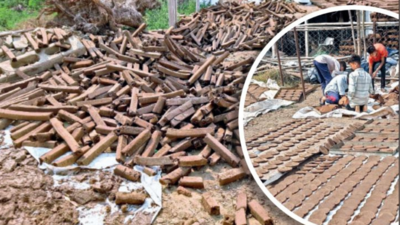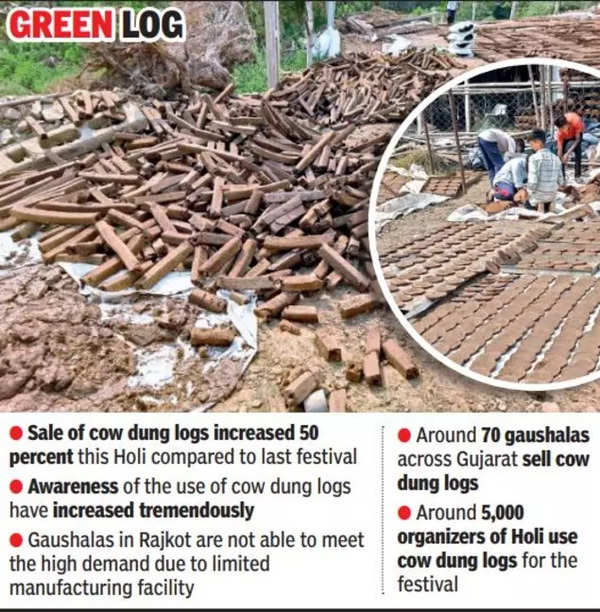Top Searches
- News
- City News
- vadodara News
- Gujarat: 50% rise in demand for cow dung logs this Holi
Gujarat: 50% rise in demand for cow dung logs this Holi

Sale of cow dung logs increased 50 percent this Holi compared to last festival
VADODARA/RAJKOT/SURAT: Somabhai Bariya was struggling to maintain the cattle pen he had opened to give shelter to abandoned bovine or those impounded while being taken for slaughtering. However, that was until Bariya struck gold with ‘gaukashta’ or cow dung logs. Today, he provides employment to around 65 persons in the shelter.

Bariya had started the shelter for cattle in area around Bakrol, and gradually the number of inmates rose to reach a stage when he had to struggle to make ends meet.
“The number of cattle kept increasing and ‘gaushalas’ nearby also could not support any more animals. I was forced to pawn my property and jewellery to support the animals. Even my son had to drop out of school and start working at construction sites to help me tide over our penury,” Bariya recalled.
But that was until cow dung articles becoming popular with the rising trend for environmental friendly rituals. Bariya soon develped ‘gaukashta’ or logs made from cow dung and forced his fortunes around. Thereafter, he has not only been able to take care of the bovine at his shelter, but also provide employment to around 65 persons.
Ahead of Holi this year, Baria’s cattle shelter has sold a whopping 120 tonnes of cow dung logs. He has been overwhelmed by demand and said that he had to say no to many as he was not able to manufacture the bars in sufficient numbers. “We had begun with one machine we had obtained from Punjab in 2019, but we had to add another machine as demand increased steadily over the years,” he said.
Mittal Khetani, member of National Advisory committee of animal husbandry and dairying ministry, who also operates the Shreeji Gaushala in Rajkot said, “Cow dung log is a win-win situation, it’s economically cheap compared to the wood and also environment friendly. Looking to the demand we can say that in next two years nearly 100 percent Holi organizers will start using cow dung log.”
Rahul Dhariya who operates a ‘gaushala’ in Devgadh Bariya and makes a variety of cow dung products said that their ‘gaushala’ ensures that no husk or agriculture waste like chaff or stubble is added to the bars. “We use only one per cent saw dust in the bars. This gives a very good hardness and finishing to the bars. They also burn quickly and generate a lot of heat,” he said.
Dhariya said that he demand for such sticks had been increasing consistently. “We have given material sufficient for 30 Holis so far even as 12 orders are in the pipeline. We will also be keeping 1,000 sticks in stock to ensure that we can give it to people keen on trying it,” he said.
“Due to awareness among citizens the demand for cow dung sticks is growing every year. We could not fulfil the demand last year since people continued coming till the last day,” said Atul Vora, general manager, Shri Surat Panjrapol. The price of the stick has been increased by Rs 5 per kg. Last year it was sold at Rs 15 per kg and this year it is available at Rs 20. Residential societies have replaced wood logs with the cow dung sticks.
(Inputs by Nimesh Khakhariya and Yagnesh Mehta)

Bariya had started the shelter for cattle in area around Bakrol, and gradually the number of inmates rose to reach a stage when he had to struggle to make ends meet.
“The number of cattle kept increasing and ‘gaushalas’ nearby also could not support any more animals. I was forced to pawn my property and jewellery to support the animals. Even my son had to drop out of school and start working at construction sites to help me tide over our penury,” Bariya recalled.
But that was until cow dung articles becoming popular with the rising trend for environmental friendly rituals. Bariya soon develped ‘gaukashta’ or logs made from cow dung and forced his fortunes around. Thereafter, he has not only been able to take care of the bovine at his shelter, but also provide employment to around 65 persons.
Ahead of Holi this year, Baria’s cattle shelter has sold a whopping 120 tonnes of cow dung logs. He has been overwhelmed by demand and said that he had to say no to many as he was not able to manufacture the bars in sufficient numbers. “We had begun with one machine we had obtained from Punjab in 2019, but we had to add another machine as demand increased steadily over the years,” he said.
Mittal Khetani, member of National Advisory committee of animal husbandry and dairying ministry, who also operates the Shreeji Gaushala in Rajkot said, “Cow dung log is a win-win situation, it’s economically cheap compared to the wood and also environment friendly. Looking to the demand we can say that in next two years nearly 100 percent Holi organizers will start using cow dung log.”
Rahul Dhariya who operates a ‘gaushala’ in Devgadh Bariya and makes a variety of cow dung products said that their ‘gaushala’ ensures that no husk or agriculture waste like chaff or stubble is added to the bars. “We use only one per cent saw dust in the bars. This gives a very good hardness and finishing to the bars. They also burn quickly and generate a lot of heat,” he said.
Dhariya said that he demand for such sticks had been increasing consistently. “We have given material sufficient for 30 Holis so far even as 12 orders are in the pipeline. We will also be keeping 1,000 sticks in stock to ensure that we can give it to people keen on trying it,” he said.
“Due to awareness among citizens the demand for cow dung sticks is growing every year. We could not fulfil the demand last year since people continued coming till the last day,” said Atul Vora, general manager, Shri Surat Panjrapol. The price of the stick has been increased by Rs 5 per kg. Last year it was sold at Rs 15 per kg and this year it is available at Rs 20. Residential societies have replaced wood logs with the cow dung sticks.
(Inputs by Nimesh Khakhariya and Yagnesh Mehta)

About the Author
Sachin SharmaSachin Sharma is special correspondent at The Times of India, Vadodara. He reports on politics, civic issues, Vadodara Municipal Corporation and Panchmahal district. He also reports on crime frequently. His areas of interest include following the debates on major issues on TV, following election coverage of all significant polls in the country, Bollywood movies, cricket, international football, spending time with friends and reading on current affairs.
Start a Conversation
FOLLOW US ON SOCIAL MEDIA
FacebookTwitterInstagramKOO APPYOUTUBE









